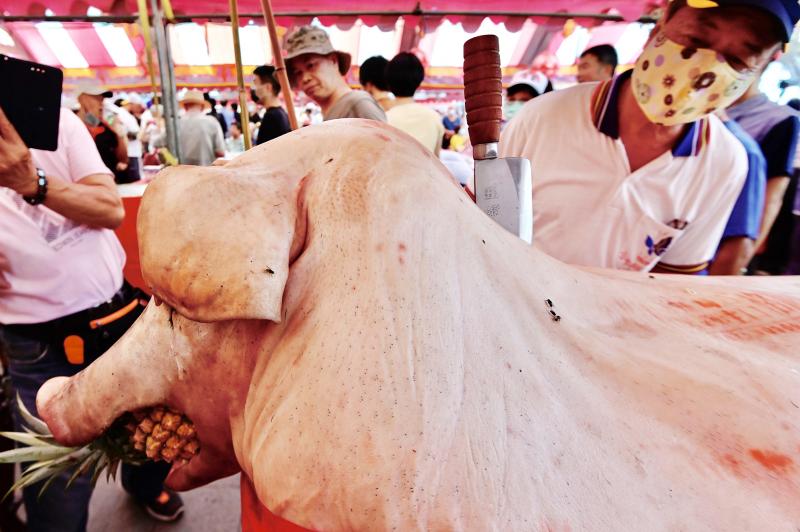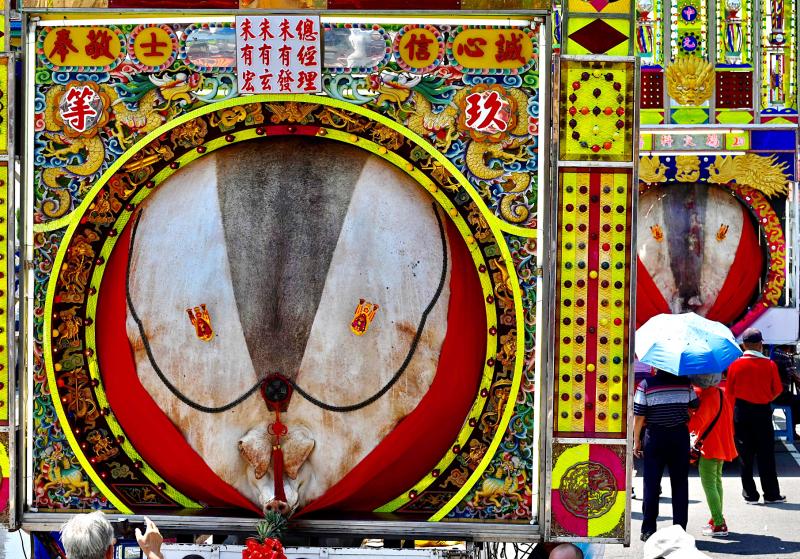A festival where enormous pigs are slaughtered and displayed is drawing smaller crowds as animal rights activists alter perceptions of the controversial tradition.
The annual ritual is a cultural cornerstone for the nation’s Hakka community, who make up about 15 percent of the population. But it has long been a polarizing custom.
Local Hakka families compete to display the largest pig, with the winner taking home a trophy.

Photo: AFP
To a fanfare of traditional music played on gongs and horns, 18 slaughtered pigs were wheeled out on trucks Monday into the Hsinpu Yimin Temple in Hsinchu County .
The heaviest weighed a whopping 860kg — three times the average adult swine. The carcasses, bristles shaved and pinned with decorations, were displayed upside-down, the heads with pineapples stuffed in their mouths, dwarfed by their bloated torsos.
After the festival, the carcasses are taken home by their owners and the meat distributed to friends, family and neighbors.

Photo: AFP
Tseng Jia-yun’s family spent three years fattening up their pig, which was slaughtered last week weighing 400kg.
The sacrifice fulfilled the wishes of his 86-year-old grandmother.
“As a Hakka, I am proud of this divine pig culture, it’s worth preserving,” he said, describing the concerns of animal rights groups as “nonsense.”
“There’s no cruelty to animals, contrary to the rumors being spread around,” he added.
OUTDATED RITUAL?
Animal rights campaigners disagree.
They say the heaviest pigs are force fed, often in small cages to the point where the morbidly obese animals are unable to get up.
The pigs are so heavy that they can’t even stand,” said Lin Tai-ching (林岱瑾), director of the Environment and Animal Society of Taiwan.
Lin has been documenting the “holy pig” festival for the last 15 years and says attitudes are beginning to change.
Crowds have begun to thin and the number of sacrifices has fallen dramatically.
“Fifteen years ago there were more than 100 swine in the contest, compared to 37 this year,” she said.
The number of animals over 600kg had also plummeted, she added.
Two submissions this year were made up of rice packets displayed in the shape of a pig, a sign that some participating families are rejecting animal sacrifices.
Researchers and locals say that while the festival dates back centuries, the tradition of sacrificing fattened pigs is a more recent phenomenon.
The Hakka are one of the many ethnic groups from China who settled in Taiwan over the last few hundred years. Each summer the Hsinpu Yimin Temple commemorates a group of Hakka who died defending their villages during a period of political upheaval in the late eighteenth century.
However, it was during Japan’s colonial occupation of Taiwan in the early twentieth century that the sacrificing of fattened pigs became a commonplace part of the celebrations. The custom then became turbocharged in the 1980s and 1990s with the pigs getting bigger and bigger.
“The Yimin festival is to honor our ancestors who died defending our homeland, a display of loyalty and brotherhood,” Tseng said.
Lin and other animal rights activists say they have no desire to end Hakka cultural customs. Instead they want to see the festival’s more cruel elements tamed. “We are not against the sacrifice of pigs,” she said, “but we are against competitions based on an animal’s weight.”

Jacques Poissant’s suffering stopped the day he asked his daughter if it would be “cowardly to ask to be helped to die.” The retired Canadian insurance adviser was 93, and “was wasting away” after a long battle with prostate cancer. “He no longer had any zest for life,” Josee Poissant said. Last year her mother made the same choice at 96 when she realized she would not be getting out of hospital. She died surrounded by her children and their partners listening to the music she loved. “She was at peace. She sang until she went to sleep.” Josee Poissant remembers it as a beautiful

Before the last section of the round-the-island railway was electrified, one old blue train still chugged back and forth between Pingtung County’s Fangliao (枋寮) and Taitung (台東) stations once a day. It was so slow, was so hot (it had no air conditioning) and covered such a short distance, that the low fare still failed to attract many riders. This relic of the past was finally retired when the South Link Line was fully electrified on Dec. 23, 2020. A wave of nostalgia surrounded the termination of the Ordinary Train service, as these train carriages had been in use for decades

Lori Sepich smoked for years and sometimes skipped taking her blood pressure medicine. But she never thought she’d have a heart attack. The possibility “just wasn’t registering with me,” said the 64-year-old from Memphis, Tennessee, who suffered two of them 13 years apart. She’s far from alone. More than 60 million women in the US live with cardiovascular disease, which includes heart disease as well as stroke, heart failure and atrial fibrillation. And despite the myth that heart attacks mostly strike men, women are vulnerable too. Overall in the US, 1 in 5 women dies of cardiovascular disease each year, 37,000 of them

Politically charged thriller One Battle After Another won six prizes, including best picture, at the British Academy Film Awards on Sunday, building momentum ahead of Hollywood’s Academy Awards next month. Blues-steeped vampire epic Sinners and gothic horror story Frankenstein won three awards each, while Shakespearean family tragedy Hamnet won two including best British film. One Battle After Another, Paul Thomas Anderson’s explosive film about a group of revolutionaries in chaotic conflict with the state, won awards for directing, adapted screenplay, cinematography and editing, as well as for Sean Penn’s supporting performance as an obsessed military officer. “This is very overwhelming and wonderful,” Anderson